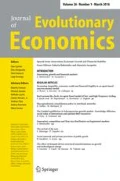Abstract.
Formal rationality plays a limited role in human cognition, which originated in the creation of patterns to interpret phenomena and link phenomena with action. The creation of new patterns rests on imagination, not logic, typically stimulated by a perceived inadequacy in established patterns. Internal routines of the brain and external institutions form structures of cognitive capital; the institutions of markets, including money prices, aid the development of consumption capital, which simplifies most choices and provides scope for selective experiment and innovation in creating goods. Such innovation depends on differences between individuals and changes in their circumstances.
Similar content being viewed by others
Author information
Authors and Affiliations
Rights and permissions
About this article
Cite this article
Loasby, B. Cognition, imagination and institutions in demand creation. J Evol Econ 11, 7–21 (2001). https://doi.org/10.1007/PL00003857
Issue Date:
DOI: https://doi.org/10.1007/PL00003857




